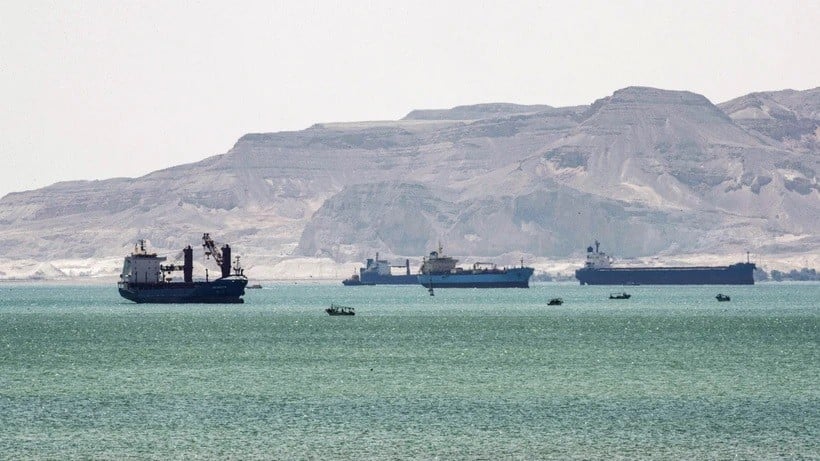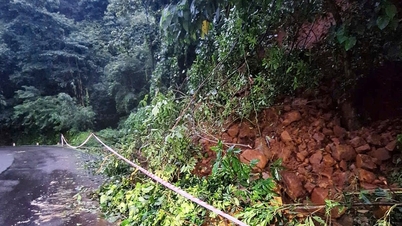| Israel-Hamas war on January 14, 2024: Israel airstrikes Hezbollah; Houthi threatens Houthi coalition to attack Panama-flagged oil tanker in the Red Sea; Asia-Europe shipping costs increase 400% |
Houthi claims attack on Israeli and US ships
Yemen's Houthi forces said they had prepared several missiles to target the Israeli cargo ship, the MSC Silver, in the Gulf of Aden, near the entrance to the Red Sea.
According to Houthi spokesman Yahya Sarea, the force used UAVs to target several US warships in the Red Sea and Arabian Sea as well as locations in the southern Israeli town of Eilat.
However, British maritime security company Ambrey said the container ship targeted by the Houthis was flying a Liberian flag and was heading to Somalia.
 |
| (Illustration) |
Houthi forces have reportedly attacked ships with commercial ties to the US, UK and Israel. Despite US-UK attacks on Houthi military sites in Yemen, Houthi forces have vowed to continue targeting Israeli-linked ships in solidarity with Palestinians until Israeli forces cease hostilities in the Gaza Strip.
“ There is no danger to international or European shipping as long as there is no aggression, so there is no need to militarize the Red Sea. What the world is eagerly waiting for is not the militarization of the Red Sea, but an urgent and comprehensive declaration of a ceasefire in Gaza, for humanitarian reasons ,” said Houthi spokesman Mohammed Abdul Salam.
Shipping lines worried about Red Sea situation
Since the Houthis began their attacks last December, most shipping lines have stopped using the usual route from Asia to Europe via the Red Sea and the Suez Canal.
CEO of Ocean Network Express (Japan), Jeremy Nixon said that many shipping lines are facing difficulties with schedules.
Instead, lines have switched to a route around the Cape of Good Hope, adding 10 days to two weeks to each trip between Asia and northern Europe, while vessels are frequently making off-schedule port calls. The pressure to stay on schedule has led to disputes over berths at some ports, creating congestion.
Container shipping lines are also dealing with a shortage of vessels and congestion at ports as the Red Sea crisis enters its third month.
The diversion of routes from the Red Sea has also created a shortage of vessels. A journey between Asia and northern Europe around the Cape of Good Hope and back takes 102 days, meaning a carrier will need to deploy 16 ships for weekly service, instead of the usual 12.
Source







![[Photo] Prime Minister Pham Minh Chinh launched a peak emulation campaign to achieve achievements in celebration of the 14th National Party Congress](https://vphoto.vietnam.vn/thumb/1200x675/vietnam/resource/IMAGE/2025/10/5/8869ec5cdbc740f58fbf2ae73f065076)





























![[Photo] Bustling Mid-Autumn Festival at the Museum of Ethnology](https://vphoto.vietnam.vn/thumb/1200x675/vietnam/resource/IMAGE/2025/10/4/da8d5927734d4ca58e3eced14bc435a3)























![[VIDEO] Summary of Petrovietnam's 50th Anniversary Ceremony](https://vphoto.vietnam.vn/thumb/402x226/vietnam/resource/IMAGE/2025/10/4/abe133bdb8114793a16d4fe3e5bd0f12)

![[VIDEO] GENERAL SECRETARY TO LAM AWARDS PETROVIETNAM 8 GOLDEN WORDS: "PIONEER - EXCELLENT - SUSTAINABLE - GLOBAL"](https://vphoto.vietnam.vn/thumb/402x226/vietnam/resource/IMAGE/2025/7/23/c2fdb48863e846cfa9fb8e6ea9cf44e7)

































Comment (0)